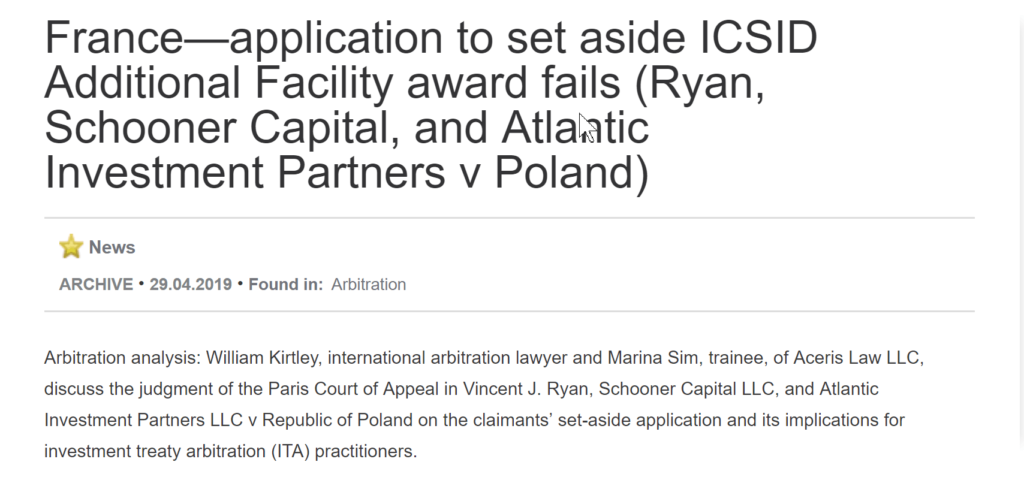William Kirtley and Marina Sim were interviewed by LexisNexis to discuss the judgment of the Paris Court of Appeal in Vincent J. Ryan, Schooner Capital LLC, and Atlantic Investment Partners LLC v Republic of Poland, and the claimants’ set-aside application and its implications for investment treaty arbitration (ITA) practitioners.
 The dispute concerned States’ authority to impose taxes. It arose out of investments made by US national Vincent J. Ryan and two American companies, Schooner Capital LLC and Atlantic Investment Partners LLC, in Kama Foods — a producer of vegetable fats that went bankrupt following a series of tax enforcement measures taken by Polish authorities. According to claimants, Poland’s actions amounted to expropriation, violations of the FET and full protection and security (FPS) standards, arbitrary and discriminatory treatment, and a violation of the right to freely transfer funds.
The dispute concerned States’ authority to impose taxes. It arose out of investments made by US national Vincent J. Ryan and two American companies, Schooner Capital LLC and Atlantic Investment Partners LLC, in Kama Foods — a producer of vegetable fats that went bankrupt following a series of tax enforcement measures taken by Polish authorities. According to claimants, Poland’s actions amounted to expropriation, violations of the FET and full protection and security (FPS) standards, arbitrary and discriminatory treatment, and a violation of the right to freely transfer funds.
The authority to impose taxes is an inherent attribute of each State’s sovereignty and an important policy instrument, which, however, may be exercised in a manner detrimental to foreign investments or investors. Hence, nearly all modern bilateral investment treaties (BIT’s), searching for a balance between States’ and investors’ interests, contain a tax carve-out provision restricting foreign investors’ rights to pursue claims in relation to taxation, while often making exceptions for expropriation claims (A. Lazem & I. Bantekas in ‘The Treatment of Tax as Expropriation in International Investor-State Arbitration’, (2015) 30 Arbitration International 1, p. 8).
There is no coherent approach to the interpretation of such tax carve-out clauses before investment arbitration tribunals. As a result, the effectiveness of tax carve-out clauses is frequently debated (see, e. g., M. Davie, Taxation Based Investment Treaty Claims, Journal of International Dispute Settlement (2015), 8, pp. 223-226).
In the Yukos cases, for instance, the tribunal did not consider itself bound by the carve-out in Article 21(1) of the Energy Charter Treaty stating that it could apply only to ‘bona fide taxation actions’ and Russia’s conduct fell outside of its scope (paragraphs [1407] and [1430]–[1445] of Hulley Enterprises Limited v The Russian Federation (UNCITRAL, PCA Case No. AA 226—Final Award dated 18 July 2014); paragraphs [1407] and [1430]–[1445] of Yukos Universal Limited v The Russian Federation (UNCITRAL, PCA Case No. AA 227—Final Award dated 18 July 2014) and Veteran Petroleum Limited v The Russian Federation (UNCITRAL, PCA Case No. AA 228—Final Award dated 18 July 2014).
In the arbitral award issued in Paris on 17 November 2015 (Vincent J. Ryan, Schooner Capital LLC, and Atlantic Investment Partners LLC v Republic of Poland, ICSID Case No. ARB(AF)/11/3 dated 24 November 2015) the majority of the arbitral tribunal declined jurisdiction over claimants’ FET, FPS and arbitrary and discriminatory treatment claims, since the State measures fell within ‘matters of taxation’ in the meaning of the tax carve-out clause, and dismissed the remaining expropriation and free-transfer claims on their merits. It also awarded USD 2,725,657.10 in costs to Poland.
On 2 December 2016, claimants commenced proceedings before the Paris Court of Appeal to set aside the award on the primary ground that the arbitral tribunal wrongly declined jurisdiction by applying the tax carve-out provision (Article 1520, 1° of the Civil Procedure Code (CPC)), as well as on the subsidiary grounds that the arbitral tribunal failed to state reasons, claimants were denied due process and that the alleged retroactivity of fiscal measures was a violation of French international public policy, all of which failed.
On 2 April 2019, the Paris Court of Appeal dismissed all of claimants’ arguments and refused to set aside the award, awarding an additional €200,000 in costs to Poland. It determined that the arbitral tribunal was correct to find that it only had competence over claims based on one of the exceptions in the clause:
- claims related to expropriation
- free transfer
- or the observance and enforcement of terms of an investment agreement or authorisation
It also considered that such a conclusion did not constitute a denial of justice even if the dispute was not susceptible of being resolved pursuant to a bilateral tax treaty.
In applying the tax carve-out provision of the BIT, the court gave prominence to the plain meaning of the terms and the common intention of the contracting States. The court even decided not to refer to the travaux préparatoires of the BIT, since the interpretation of Article VI(2) of the BIT was found to be clear and reasonable. The court also did not rely on a report on the BIT addressed by the US Department of State to the Senate as not reflecting the common intention of both States, and on the Energy Charter Treaty as being completely irrelevant for the interpretation of the BIT.
The Paris Court of Appeal’s approach, based on the plain meaning of the BIT, provides more predictability and enables States, otherwise reluctant to enter into investment protection treaties, to effectively carve out certain investment protections in order to pursue bona fide tax policies.
